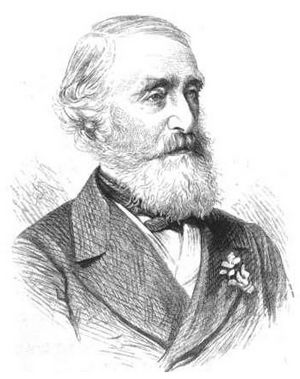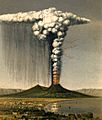George Julius Poulett Scrope facts for kids
Quick facts for kids
George Julius Poulett Scrope
|
|
|---|---|

George Julius Poulett Scrope
|
|
| Born |
George Julius Poulett Thomson
10 March 1797 |
| Died | January 19, 1876 (aged 78) Cobham, Surrey
|
| Nationality | English |
| Alma mater | St John's College, Cambridge |
| Known for | Describing volcanoes |
| Spouse(s) | Emma Phipps Scrope |
| Awards | Wollaston Medal (1867) |
| Scientific career | |
| Fields | Geology |
George Julius Poulett Scrope (born March 10, 1797 – died January 19, 1876) was an important English scientist. He was a geologist, which means he studied the Earth's rocks and how they formed. He was also a political economist, looking at how money and society work together. Besides his scientific work, he was a Member of Parliament (MP) and a local judge.
George Scrope became very interested in volcanoes. He traveled to places like Mount Vesuvius and Mount Etna to study them up close. His research helped us understand how volcanoes shape our planet. He also wrote important books about geology and volcanoes.
Contents
Exploring Earth's Volcanoes
Early Life and Education
George Julius Thomson was born in London in 1797. His family was well-off. He had an older brother, Charles, who became a politician.
George went to Harrow School, a private school. Later, he studied at Oxford and then Cambridge. At Cambridge, he met professors who sparked his interest in geology. He learned about rocks and minerals.
In 1821, George married Emma Phipps Scrope. He then took her last name, becoming George Poulett Scrope. They lived in a historic house called Castle Combe Manor House.
Studying Volcanoes Up Close
George Scrope's passion for volcanoes began during a trip to Italy. He visited Mount Vesuvius and saw its power firsthand. This experience made him want to learn everything about volcanoes.
He traveled to volcanic areas in France and Germany. He studied how volcanoes erupt and how they create different types of rocks. In 1825, he published a book called Considerations on Volcanos. This book was one of the first to explain how volcanoes work.
Scrope's work helped change old ideas about Earth's history. Some scientists believed all rocks formed in a great ocean. This idea was called Neptunism. Scrope showed that volcanoes created many rocks through heat and fire. His detailed drawings and research proved this.
Working with Other Scientists
George Scrope became a member of the Royal Society, a famous group of scientists. He also worked closely with Sir Charles Lyell, another famous geologist. They were good friends and helped each other's research.
Lyell and Scrope believed in a theory called uniformitarianism. This idea says that the same natural processes we see today (like volcanoes erupting or rivers flowing) have shaped Earth over long periods. They argued that the present is the key to understanding the past.
Scrope also exchanged letters with Charles Darwin, who was exploring the world on the HMS Beagle. Darwin asked Scrope for advice on geological observations. Their friendship helped advance the science of geology.
A Life in Politics and Economics
Helping People as a Politician
Besides geology, George Scrope was very interested in politics and helping people. He became a local judge, called a magistrate. He saw the struggles of farmers and workers.
In 1833, he became a Member of Parliament (MP) for Stroud. He kept this job for many years. Even though he wasn't a loud speaker in Parliament, he wrote many pamphlets. These were short books or essays about political and economic issues. People even called him "Pamphlet Scrope."
Ideas on Money and Society
Scrope wrote a lot about how the economy should work. He believed that governments should try to create jobs and help people. He thought that if people had more money to spend, it would help the economy grow.
He also disagreed with some popular ideas about poverty. Some believed that giving aid to the poor would make the population grow too fast. Scrope argued that society should focus on helping people and improving their lives. He even suggested that people could move to British colonies to find new opportunities.
George and Emma Scrope adopted a son named Arthur Hamilton. Arthur later went to famous schools like Eton College and Oxford.
Later Years and Legacy
In his later years, George Scrope's health declined, and he became blind. He retired from politics but continued to advise young geologists. He also published new editions of his earlier books.
In 1867, he received the Wollaston Medal. This is the highest award from the Geological Society of London. It recognized his groundbreaking work in geology.
George Scrope passed away in 1876, less than a year after his good friend Charles Lyell. He is remembered as a dedicated scientist who helped us understand volcanoes and the Earth's history. He also worked hard to improve society through his political and economic ideas.
Images for kids
 | Percy Lavon Julian |
 | Katherine Johnson |
 | George Washington Carver |
 | Annie Easley |


